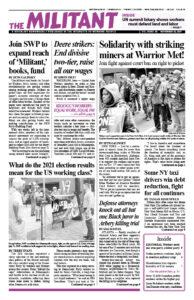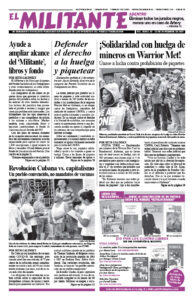ATLANTA — Family members of Ahmaud Arbery and their supporters expressed anger at the way jury selection turned out in the trial of three vigilantes who killed the Black youth. All but one of the 12-member jury and three alternates are Caucasian, even though a quarter of the residents in Glynn County, where the trial is being held, are Black.
Twenty-five-year-old Arbery was chased and gunned down in February 2020 while jogging in a Brunswick, Georgia, neighborhood by Travis McMichael and his father Gregory. They were joined in the fatal assault by William Bryan, a neighbor who captured the killing on his cellphone.
The jury selection is “just another injustice that we face,” Thea Brooks, Arbery’s aunt, told MSNBC. She had hoped that at least one juror would be a Black woman, someone who “looks like me.” Nonetheless, Brooks expressed confidence that when the evidence is shown guilty verdicts will be returned. Brooks has led protests since last year demanding the arrest and prosecution of Arbery’s attackers.
Judge Timothy Walmsley denied a prosecution motion challenging the defense striking virtually all potential jurors who are Black from the jury. The prosecution says this was racially motivated. But the judge ruled the defense gave “legitimate, nondiscriminatory, clear and reasonably specific” reasons. At the same time, he admitted, “intentional discrimination” appeared to have shaped jury selection, but said Georgia law limited his ability to intervene.
Gregory McMichael is a retired cop and former investigator in the local prosecutor’s office. For two months after the shooting cops and local prosecutors did everything possible to avoid arresting him and his son. As protests took place, two prosecutors opted out of the case. Finally the third charged all three assailants with malice and felony murder. They also face federal hate crime and attempted kidnapping charges. They have pleaded not guilty to both sets of charges.
A University of California at Berkeley study in 2020 shows how easily prosecutors get around a U.S. Supreme Court decision barring the exclusion of jurors on the basis of race. It found that in appellate court cases in California from 2006 to 2018 potential jurors who are Black were excluded in about 72% of cases. Prosecutors removed potential jurors who are Caucasian only 0.4% of the time. “Valid” reasons given for excluding Black jurors included they had “visited family members who were incarcerated,” and “had negative experiences with law enforcement.”
Footage from police body cams show Arbery’s assailants were treated as “part of ours” by cops who arrived on the scene. They casually banter with the McMichaels. No attempt is made to render aid to Arbery.
Gregory McMichael is shown telling cops that Arbery was attempting to take the shotgun from his son and that Travis McMichael had no choice but to fire at him. “To tell you the truth if I had a chance I’d of shot him myself.”
The defense claims Arbery’s attackers acted in self-defense as they tried to detain him under the state’s citizen’s arrest law. They say he may have been involved in a burglary. The defendants will be tried under the Civil War-era vigilante law despite its recent repeal.

